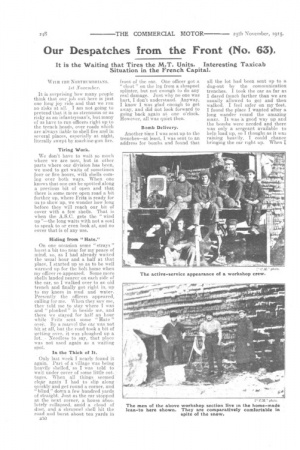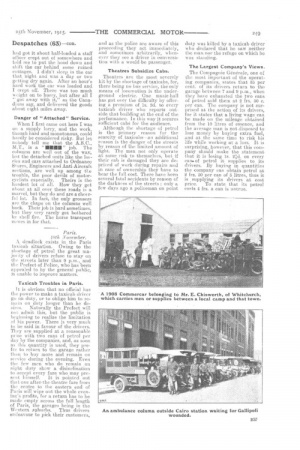Our Despatches from the Front (No. 65).
Page 8

Page 9

If you've noticed an error in this article please click here to report it so we can fix it.
It is the Waiting that Tires the M.T. Units. Interesting Taxicab Situation in the French Capital.
WITH THE NORTHUMBRIAN& 1st November.
It is. surprising how many people think that our job out here is just one long joy ride and that we run no risks at all; I am not going to pretentahat it is as strenuous or as risky as an infantryman's, but many of us have to run officers right up to the trench heads, over roads which are always liable to shell fire and in several places, especially at night, literally swept by machine-gun fire.
Tiring Work.
We don't. have to wait so much where we are now, but in other. parts where our division has been, we used to get waits of sometimes four or five hours, with shells coining over both ways. When one knows that one can be spotted along a previous bit of open and that there is some more open road a bit further up, where Fritz is ready for us to show up, we wonder how long before they will reach our bit of cover with a few shells. That is when the A.S.C. gets the "wind up "—the long waits with not a soul to speak to or even look at, and no cover that is of any use.
Hiding from ‘!Hate."
On one occasion some " strays" burst a bit too near foi'mY peace of mind, so, as I had already waited the usual hour and. a half at that place, I started up so aste be well warmed up for the bolt home when my officer re-appeared. Some more shells landed nearer on each side of the car, so I walked over to an old trench and finally got right in,. up to my knees in mud and water. Presently the officers appeared, calling for me. When they saw me, they told me to stay where I was and " plonked" in beside me, and there we stayed for half an hour While I Fritz sent some " Hate " over.. By a marvel the car was not hit at all, hut the road took a bit of getting over, it was ploughed up a lot:. • Needless to say, that place was not used again as a waiting
spot. • In the Thick of It. •
Only last week. I nearly found it again. Part of a village was being heavily shelled,so I was "told to wait Under cover of some little cottages. When all things -seemed cleAr again I had to slip along quickly and get round a corner. and " blind "•-doWn a few -hundred yards of straight, Just as the oar stopped at the next corner, a house absolutely collapsed, amid • a cloud of dust., and a 'shrapnel shell bit the road and burst about ten yards in
B30 front of the car. One officer got a "
clout" on the leg from a shrapnel splinter, but not enough to do any real damage. Just why no one was hurt, I don't. understand. Anyway, I know I was glad enough to get away, and did not look forward to going hack again at one o'clock. However, all was quiet then.
Bomb Delivery.
Another time I was sent up to the trenches—at least, I was sent to an address for bombs and found that
all the lot had been sent up to a dug-out by the communication trenches. I took the car as far as I dared (much farther than. we are usually allowed to go) and then walked. I feel safer on my *feet. I found the place I wanted after a long wander round the amazing maze. It was a, good way up and the bombs were needed and there was only a sergeant available to help load up, so I thought as it was raining heavily. I could chance bringing the car right up. When I
had got it about half-loaded a staff officer crept out of somewhere and told me to put the hoed down and shift the car behind some ruined cottages. I didn't sleep M the car that night and was a day or two getting dry again. After an hour's hard work the ear was loaded and I crept off. There was too much weight on to hurry, but after all I " got away with it," as the Canadians say. and delivered the goods about eight miles away.
Danger of "Attached" Service.
When I first came out here I was on a supply lorry, and the work, though hard and monotonous, could hardly be considered risky, But let nobody tell me that the A.S.C., ALT., is a AMIE " job. The columns are well out of the way, but the detached units like the loi ries and cars attached to Ordnance SI ores, Engineers and Anti-Aircraft sections, are well up among the trouble, the poor devils of motor cyclists especially. Theirs is the hardest lot of all. How they get about at all over these roads is a marvel, but they do and are a cheerfurl lot. In fact, the only grousers are the chaps onthe columns well back. Their job is hard sometimes, but they very rarely get bothered by shell fire. The horse transport comes in for that.
Paris.
10th November.
A deadlock exists in the Paris taxicab situation. Owing to the shortage of petrol the great majority of drivers refuse to stay on the streets later than 9 p.m., and the Prefect of Police, who has beenalipealed to by the general public,
is unable to improve matters. • ..
Taxicab Troubles in Paris.
It is obvious that no official has the power to make a taxicab driver go on duty, or -to oblige him to remain on duty longer than he de sires. Naturally the Prefect will net admit this, but the public is beginning to realize the limitation of his power. There is very much to be said in favour of the drivers. They are .supplied at a reasonable price with two cans of petrol per day by the companies, and, as soon as this quantity is used, they prefer to return to the garage rather than to buy more and remain on service during the evening. Even the few men who de remain on night duty show a disinclination to accept every fare who may pre
sent himself. It is pointed out that one after-the-theatre fare from the centre to the eastern end of Paris will wine out the whole evening's profits, for a return has to be made empty across the full length of Paris, the garages being in the Western suburbs. Thus drivers endeavour to pick their customers, and as the police are aware of this proceeding they act immediately, and sometimes arbitrarily, whenever they see a driver in conversation with a would-be passenger.
Theatres Subsidize Cabs.
Theatres are the most severely hit by the shortage of taxicabs, for, there being no bus service, theonly means of locomotion is the underground electric. One music-hall has got over the difficulty by offerlug a premium of is. 2d. to every taxicab driver who reports outside-that building at the end of the performance. In this way it secures
sufficient cabs for the audience.
Although the shortage of petrol is the primary reason for the scarcity of taxicabse-an additional reason is the ,danger of the streets by reason of the limited amount of light. The men not only operate at some risk to themselves, but if their cab is damaged they are deprived of work during repairs and in aaSe of ownership they have to bear the full cost. There have been several fatal accidents by reason of the darkness of the streets ; only ij few days ago a policeman on point
duty was killed by a taxicab driver who declared that he saw neither the mark nor the refuge on which he was standing.
The Largest Company's Views.
The Compagnie Generale, one of the most important of the operating . companies,. slates that 85 per cent: of its drivers return to the garage between 7 and 9 p.m., when they have exhausted the two cans of petrol sold them at 2 frs. 50 c. per can. The company is not -surprised at the action of its drivers, for it states that a living wage can be made on the mileage obtained from the 10 litres of essence, and the average man is not disposed tolose money by buying extra fuel, and at the same time to risk his life while working at a loss. It is surprising, however, that this company should make the statement that it is -losing is. 2,14. on every can of petrol it supplies to its drivers. By buying in quantities the company can obtain petrol at 2 frs. 50 per can of 5 litres, thus it Ii . supplying its drivers at cost price. TO state that its petrol
costs 4 frs. a can is untrue. •




















